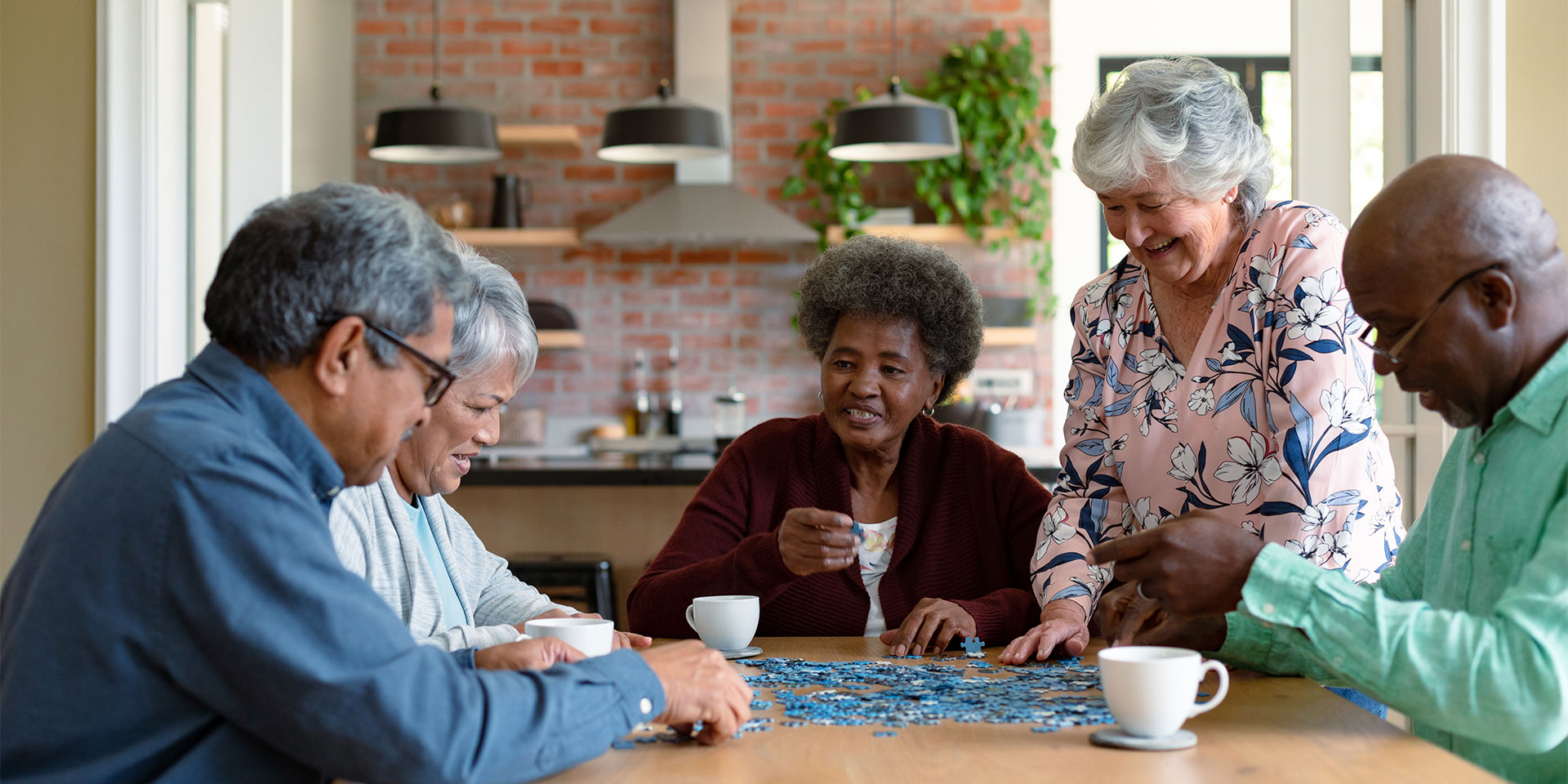We’ve all been guilty of memory lapses at times—forgetting a birthday or anniversary, that needed ingredient we were supposed to pick up at the grocery store, where we put our car keys, even where we parked the car. And mostly we just joke about these memory lapses and tease each other about them. However, for some 50 million people around the world who currently live with dementia, issues with remembering things are no laughing matter.
In 2016, dementia became the leading cause of death among Australian females, surpassing heart disease, which has long been the leading cause of death for both males and females since the early 20th century. Meanwhile, in the United States, a woman 65 years or older has a one-in-six chance of developing Alzheimer’s disease. A man the same age has a one-in-11 chance. Worldwide, there are an estimated 46.8 million people living with dementia, projected to rise to more than 115 million by 2050.
It should be noted that dementia is not exclusive to people over the age of 65. “Younger onset dementia” occurs in people under the age of 65 and accounts for up to 9 percent of cases around the world. In general, the number of people with dementia around the world continues to rise, with nearly ten million new cases occurring each year.
According to the World Health Organization, the total number of people with dementia is projected to reach 82 million by 2030. It is then projected to increase to 152 million in 2050.
With these kinds of statistics, chances are likely that a family member or friend of yours is currently living with or will one day have dementia.
The symptoms
How can you recognize symptoms of dementia in either yourself or a family member?
“Personality and behavioral changes—depression or withdrawal, loss of ability to do daily tasks, reduced concentration, increasing confusion, memory problems and not being able to remember recent events,” says Tamar Krebs, CEO of Group Homes Australia.
“There are several types of dementia—the most common being Alzheimer’s disease—(but) there is a good deal of overlap in the symptoms each form carries,” cognitive neuroscientist Maree Farrow told Australia’s national broadcaster ABC, on Health & Wellbeing in 2017.
She mentions many of the same symptoms as Krebs, including difficulty in performing familiar tasks, mood and behavior changes, personality changes, and loss of initiative.
“Scanning a list of early warning signs can help you work out if you need further assessment,” Farrow said. “It may turn out you don’t have dementia at all, but rather one of a range of other conditions that can cause similar symptoms, and which may be highly treatable.”
She also points out that if you or a family member does have dementia, you have a better chance of benefiting from medication if a diagnosis is made early.
“We started wondering if something was wrong with my grandfather when he started telling the same stories over and over again,” says Mary Foster, a middle-aged woman. Her family cared for her grandfather until he passed away in 2015. However, the most telling symptom of dementia turned out to be his difficulty in cooking and a gradual loss of both smell and appetite.
“He used to be great at cooking—much better than my grandmother!” confesses Mary. “But suddenly he wasn’t very interested in it anymore, not even when we asked him to do it.”
Impact of dementia
Someone in the world develops dementia every three seconds. That’s just one of many shocking statistics revealed by the 2015 World Alzheimer’s Report. The report also noted the current global cost of dementia was $US 818 billion each year, and predicted that starting 2018, it would be considered a “trillion dollar disease.”
An earlier report (2010) estimated that dementia would cost US $604 billion. This was no paltry estimate, however the 2015 report demonstrates that the cost of dementia has actually increased by a significant 35 per cent since the 2010 report was released.
But we can’t put a number to the emotional impact that dementia has, not only on those who are suffering from it, but also on the people who care for them.
According to Carers Australia, there is an estimated 2.7 million informal carers in Australia—400,000 of whom provide care for someone aged over 65 and 300,000 who support someone living with dementia. In the United States, the majority of people with dementia live in the community (estimates vary between 70 percent to 81 percent) and for approximately 75 percent of these individuals, care is provided by family and friends. In 2007, approximately 10 million Americans were caring for a person with Alzheimer’s disease or another dementia.
Reducing the risk
“As a society, we need to do more to reduce people’s risk of dementia so that we can delay or avoid the onset of dementia,” says Krebs. “There is no cure for dementia.”
When asked how dementia risk can be reduced, she observes that what is good for our heart is also good for our brain.
“This includes keeping physically active, mentally challenged, eating a healthy brain food diet such as the Mediterranean diet, getting enough sleep, remaining socially engaged, and getting regular health checks.”
Farrow agrees, saying, “We know from a lot of research that people who do more stimulating activities throughout their life have better brain function and a lower chance of developing dementia.”
Sudoku and crossword puzzles are often touted as popular ways to keep mentally active, however there are many other options such as learning a second language, pursuing a course of study, reading widely, or learning a musical instrument.
“There’s no reason you should sit down and do a crossword every day if you hate crosswords,” remarks Farrow. “Choose something else you’re going to enjoy. And if you’ve been doing crosswords for 30 years and are really good at them, it’s not going to be as stimulating for your brain as trying something you’ve not done before.”
“The key to success in giving an activity to a person with dementia is that it has to be engaging,” says Dr Lee-Fay Low in her insightful book Live and Laugh with Dementia. “The person with dementia has to want to start it and keep doing it.”
She notes that an activity is more likely to be engaging for a person with dementia if it is meaningful (of interest or value to the person) and achievable (at a level at which they can successfully participate in or complete).
“The only way to know what a person with dementia can do is to be observant and to consider each ability individually,” she explains.
Mary tried to get her grandfather to do crossword puzzles, but he didn’t enjoy them. However he did develop an interest in playing with Lego. “It was great for him because it was a simple way to practice his motor skills and cognitive skills as well as be creative,” says Mary. “He could literally spend hours sitting down and creating buildings with his Lego.”
And because Mary’s grandfather still enjoyed being in the kitchen, Mary assigned him simple tasks, so that he could still feel like he was contributing. She also took her grandfather on 30-minute walks each day, believing that physical activity was just as important for his brain as mental activity. Regular aerobic exercise, including walking, in sessions of at least 30 minutes has been found to be beneficial for cognitive health. It is thought that exercise may improve blood flow to the brain, reduce cardiovascular risk factors and possibly stimulate nerve cell growth and survival.
A study conducted by Cardiff University monitored the health habits of more than 2000 men over a 35-year period and confirmed that exercise significantly reduces the risk of dementia.
The study identified five healthy behaviors as being integral to having the best chance of leading a disease-free lifestyle: regular exercise, not smoking, maintaining a low body weight, a healthy diet and a low alcohol intake.
The people who consistently followed four or five of these recommended behaviors experienced a 60 percent decline in dementia and cognitive decline—with exercise being the strongest mitigating factor—as well as 70 percent fewer instances of diabetes, heart disease and stroke, compared with people who followed none of these.
Professor Peter Elwood from Cardiff University’s School of Medicine noted that the research showed healthy behaviours had a far more beneficial effect than any medical treatment or preventative procedure.
Dementia support
Dementia Care Central suggests that caregivers for people with dementia often bear a heavier burden in comparison to other caregivers. In fact, 25 percent of these carers in the United States spend at least 40 hours a week caring for their loved one, or what we might consider a full-time job. What makes things even more difficult is that nearly 33 percent of these dementia caregivers are also caring for children under the age of eighteen in their household.
“It’s really important to seek support as a carer,” says Mary. “Many people don’t realise how much exhaustion and frustration carers experience. It’s difficult enough seeing your family member or friend going through something like this. It’s even harder when you’re trying so desperately to make a positive difference and you’re not sure if you are making any difference at all.
“My advice would be to look for a support group in your local area. You’ll have the chance to meet other carers at different stages on the same journey, ask all the questions you want to, even just share what you’re going through. You should be able to find a local support group but if you can’t, start one of your own—I guarantee there will be other people in your situation hoping for support as well.”
Vania Chew is based in Sydney and works as a marketing assistant at Adventist Media. A version of this article first appeared on the Signs of the Times Australia website and is republished here with permission.



















